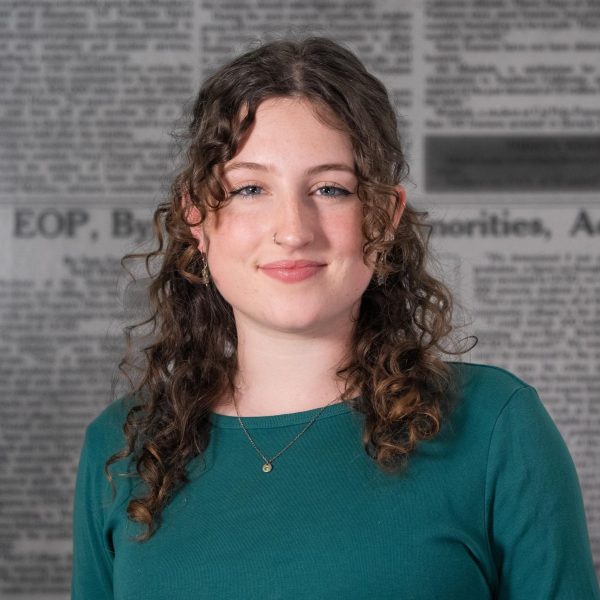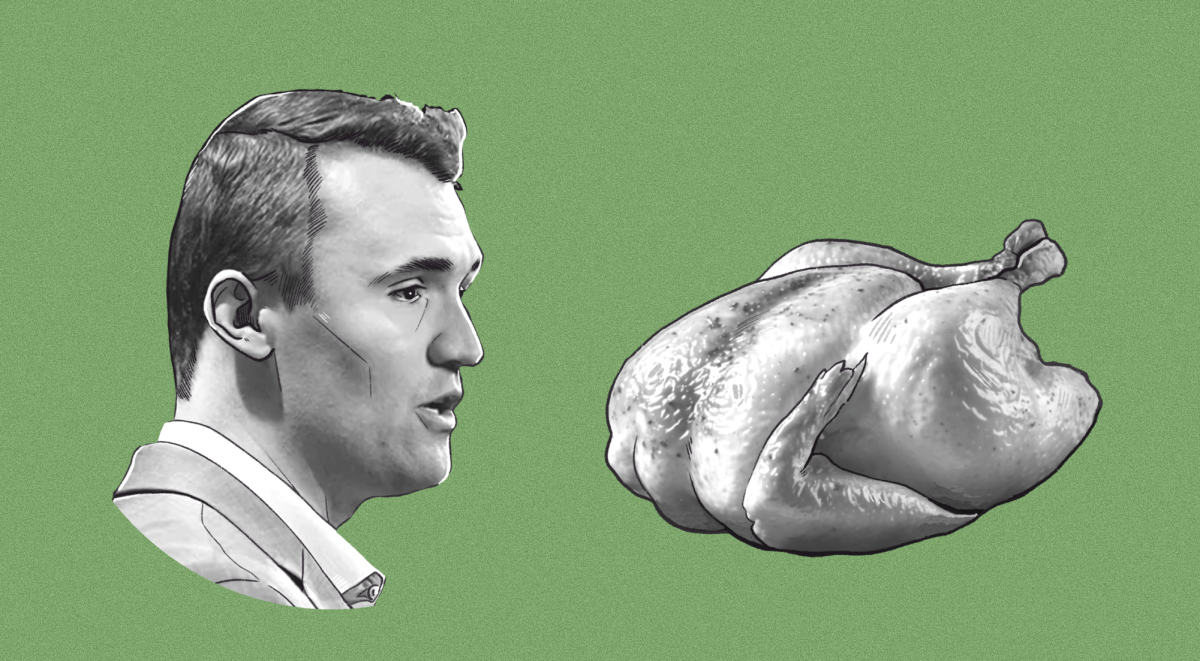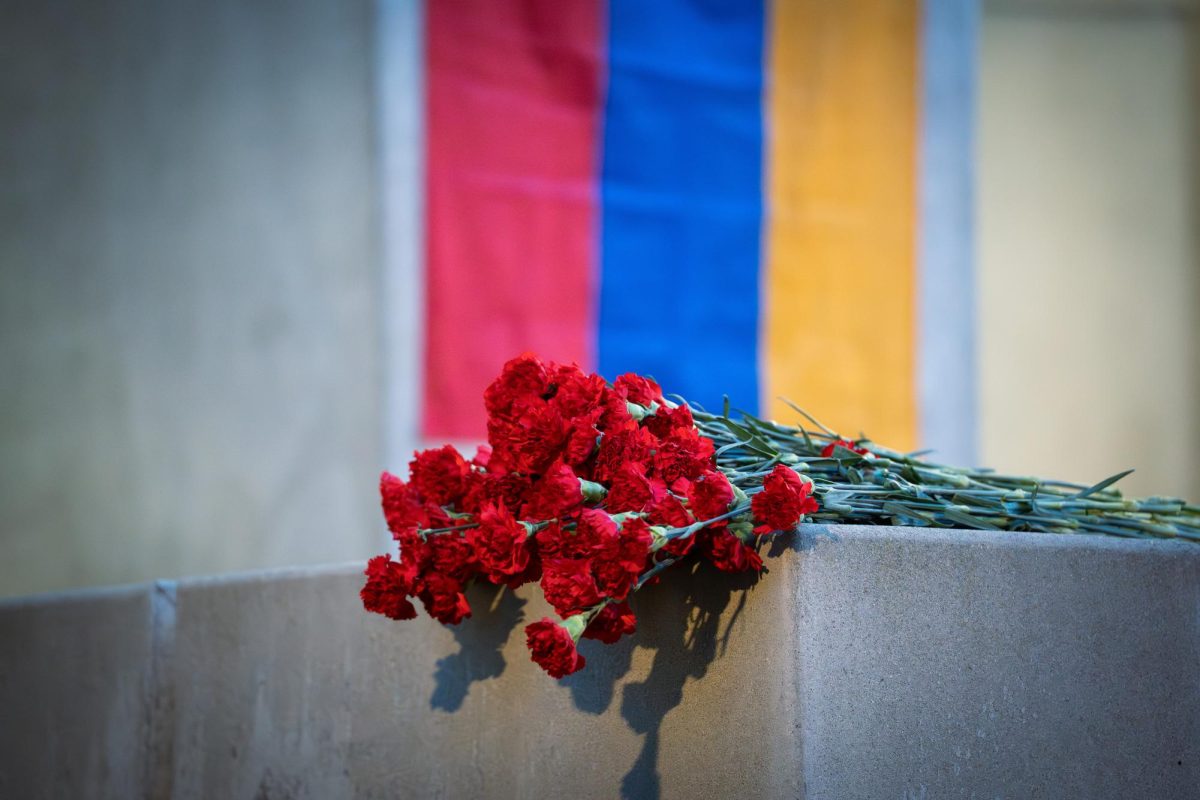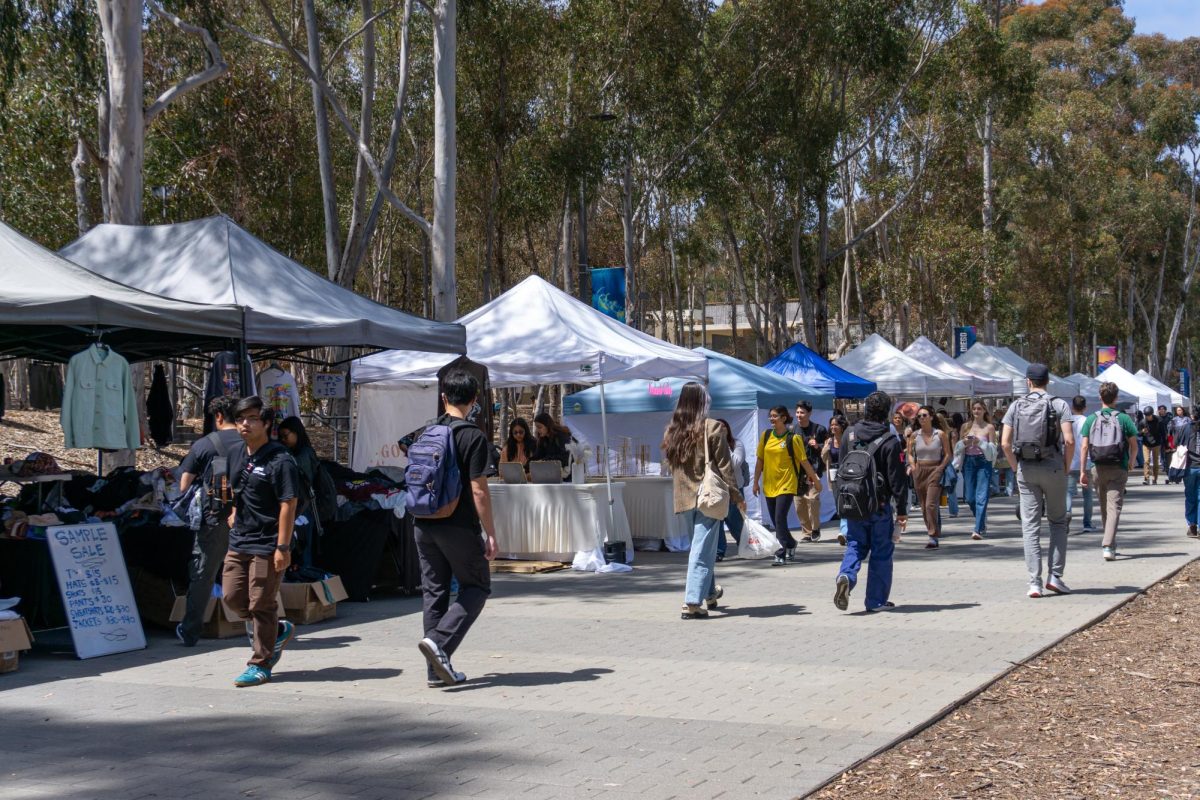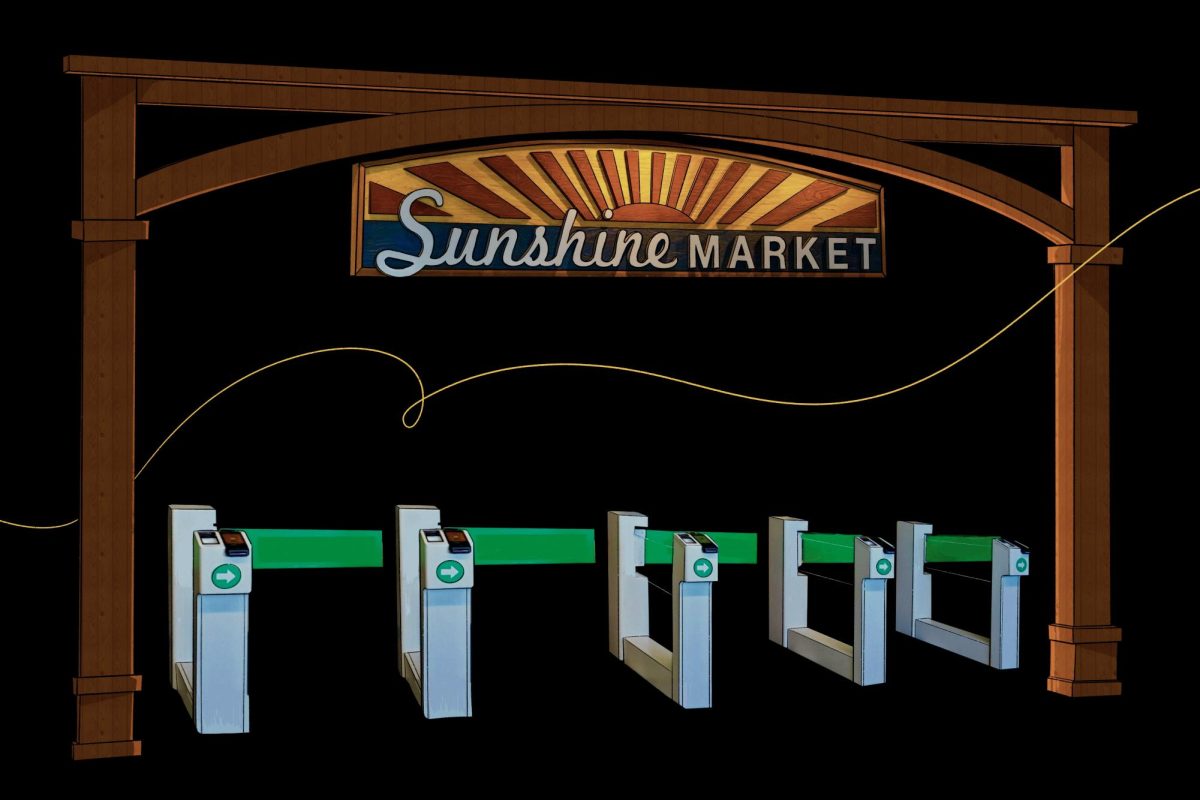On May 1, 2024, a group of UC San Diego students and community members set up the UCSD Gaza Solidarity Encampment, following in the footsteps of students across the nation protesting in support of Palestine. University administrations across the United States dismantled their encampments using police force, including at UCSD, where 64 participants were arrested.
For the one-year anniversary of the encampment, The UCSD Guardian sat down with eight of the 20 people featured in the project Voices from Inside the Encampment. Last year, those interviewees told the story of the encampment and its aftermath firsthand. This year, they shared how the legal, personal, and institutional fallout continues to shape their lives and perspectives.
Interviewees shared both starkly different and eerily similar reflections and takeaways from their experience last May. For many, the encampment marks an important moment in their personal trajectories as activists and the evolution of activism at UCSD. As alumni or current students, they are forever tied to UCSD, and must decide how they will continue to engage with social justice in the professional and social world.
In our interviews, these activists reflected not only on their personal experiences, but on the structural effects of their actions, the future of the encampment movement, and the present challenges of protesting under the second Trump administration.
Several common areas of conversation and reflection among these activists emerged across the interviews. The Guardian has organized their quotes according to these areas to understand and represent a picture of their post-encampent lives. All interviewees are referred to by the same pseudonyms they selected for our original May 2024 piece to protect their identities.
Editor’s Note: The following story does not necessarily reflect the entirety of the experiences of the people involved.
Do they feel satisfied with the impacts of their protest?
“I think it’s also made me feel satisfied in a lot of ways because I can say that I’ve really helped in a way to bring awareness to this issue, and also used my voice to uplift those of people who are suffering.” — Skylar
“It’s less a feeling of I shouldn’t have done that, it’s more a feeling of … it feels like it was for nothing. I wish more came out of it. … I think, a lot of times, especially related to social justice things, that it’s still worthwhile to do, even if it seems like it doesn’t amount to anything. But that doesn’t take away that frustration that it kind of does feel like it was for nothing.” — Sunflower
“I think I am satisfied with what it did for the community. I think that the encampment and the arrests were sort of a wake-up call for the broader UCSD community in terms of how the administration and the institution views and treats protestors, and I think that if nothing else that is a great takeaway from the encampment.” — Lølø
“This year, I feel like the numbers have just dwindled. … I don’t know if they’ve forgotten or if they’re just like ‘Well I’m busy,’ or, ‘People already got arrested, and we already had the big thing,’ and it’s like, no, the big thing was supposed to inspire everyone else to continue with this movement.” — Joe
“It really did make me sort of lose faith in pluralism and democracy and speech and all of that. Cause, you know, all across the country, you know, people took the streets, they sat around in tents, and they occupied their campuses, some occupied buildings, some were riots, some were completely peaceful … but none of it [f——-] mattered.” — Nava
“Obviously, when we were protesting, we were protesting for Palestine, so the only ultimate metric of success would be whether what we did contributed to their liberation in some way. After the arrests, I remember how some people told me that people living in Gaza were very inspired and hopeful because of the encampments — as much as they could be, obviously — but I think, I don’t know, providing hope to people who are living through the worst you can imagine is … it’s not nothing.” — Jordan
“I do wish that some of that momentum had carried on. It kind of feels like it’s something that happened and then it stopped. And I’m not seeing that momentum pick up on campus just yet.” — Craig
“I think the focus was truly on healing and solidarity and genuine like bringing the Palestinian experience to light, and information sharing, and an affirmation of values moving forward — I think it was very successful in that regard. It was the most healing and welcoming or community space that I had ever experienced.” — Gertrude
Do they have any regrets?
“The only regret I really have is not being louder.” — Skylar
“I think, generally speaking, I’m a person who doesn’t really regret anything that I do. You can make meaning of everything that happens. I don’t regret being at the encampment. I think if I was put in that spot again, I would do it again.” — Sunflower
“I think the only regret I have is not joining the encampment sooner.” — Joe
“I’ve thought long and hard about it, but every time, I’ve just been like, ‘Nope, I would make the same choices I did. I would still choose to stay.’” — Gertrude
“I don’t regret standing up for what was right.” — Jordan
“No. I don’t regret that I got arrested or that I was there, but I do regret that I didn’t play a role in making sure things continued to happen.” — Craig
“Absolutely not.” — Lølø
How did UCSD change for them and their peers?
“The things that happened last year did the opposite of what the University intended. I think it made the students much more radical, or wanting to make much more radical change, and are significantly angrier at the institution that they attend.” — Craig
“I think this is a point where UCSD has to make a decision: Are we going to make the same mistakes over and over again, where we pick the bottom line over our students? And I hope that they will make the better choice.” — Skylar
“[Now, I have] more of an antagonistic relationship to the University itself. I still am very attached to the people I met here. I have a lot of fondness for the different aspects of student life I was part of on campus and the classmates and professors that supported me. But I think the University itself has made a lot of decisions that alienated a lot of its student body, myself included.” — Jordan
“By showing how brutal they’re willing to be toward their own students, faculty, staff, community members — and how they’re willing to put all of that brutality into place to protect investing in genocide — it’s really opened a lot of people’s eyes to what the true motivations of the university are.” — Jordan
“Before, I think I was with just the general student population where, like, yeah, it’s a school. It’s humongous. They’re not gonna be able to take care of everyone. But now I’m realizing, with all the information that came out and everything, every choice that the administration made … I know that they don’t really care.” — Gertrude
How has activism at UCSD changed since last May?
“I think, with the repression, the University has contributed to the escalation of the struggle because students have been radicalized.” — Jordan
“I think that, for a lot of students, even if they’re not directly part of it, there’s always gonna be that scar there, that’s like, this is a school that’s willing to hurt people.” — Sunflower
“I would hope that this is a thing that stays in the general conscience of the student body. … If we’re not doing things to keep that memory alive and keep the ramifications of the protest and the administration response in the student body’s conscience, I’m not sure how lasting of an impact it’s going to have, if it will have one at all, at least outside of the activist circles at UCSD.” — Lølø
“This will continue on, for as long as there are things that the student body disagrees with the University on.” — Craig
How have their identities as activists changed?
“I don’t let other people tell me what I believe now because I know what I believe, and my legal record shows it. I don’t need random strangers to validate my beliefs.” — Skylar
“It feels like it has become such a bigger part of me, and I feel a lot more comfortable speaking out now than I did before. So, that’s really nice at least, how much more comfortable I feel being more open about my values and beliefs and activism in general.” — Joe
“I’ve had to avoid doing any kind of risky or super visible activism since the arrests last year, and part of that is related to having the disciplinary sanctions from the school and also the possibility of charges still being filed in court. Part of that is the very real memories of like … straight up fear from that experience of May 6 and the aftermath of how real the consequences can be when protests are criminalized.” — Jordan
“It definitely made me feel brave. It made things a little less scary. I feel like I’ve been prepped more to face things that are going to come up with this new administration. But at the same time, it’s also made me a lot more aware of the circumstances that we are in, about how bad things are, even if on the surface things appear fine, and people are continuing on, continuing on as normal.” — Gertrude
How did the encampment change your experience on campus?
“When I first came back, it was almost eerie in a way. It almost didn’t feel real. As things have remained quiet, I’ve sort of settled into the humdrum of life. But there are still moments that will trip me out.” — Nava
“Whenever I walk past the encampment and where they put all those hammocks, I laugh. In some ways, it makes me proud; I’m like, we did that — we had so much of an impact that they had to physically change the campus to make sure that we wouldn’t be able to do something similar again.” — Skylar
“I think, overall, the biggest thing is just looking at something and being like, ‘Wow. So many people passed by this, and they don’t know what happened here.’ But I think that’s kind of what I felt before too. I think it’s just a chilling reminder that the world continues spinning.” — Sunflower
“Every time I step foot onto the lawn, I just think … ‘Wow.’ … It’s hard to even have words. It’s just like the campus just tried to shut us up by putting poles in the ground, and so I can get paid, I have to put the hammocks up, and it’s just such a sad thing to have to walk by that every day, knowing that not everyone knows what happened and not everyone cares as much as I do. It’s hard.” — Joe
“Freshmen don’t know what these spaces were used for — like going into the ballroom at the Price Center where we were all zip tied on chairs that were placed systematically beforehand, and there’s stations where people’s photos are being taken, and there’s at least 15 to 20 cops in there. … Like there’s no evidence that anything has actually happened. It’s quite strange.” — Craig
“It does give me almost a sense of grief because, while Price Center, to me, doesn’t hold and never held any significant value to me as a space, I know people there find refuge, and there’s community centers there. So, it’s frustrating and sad to see that it’s a very just misaligned experience there.” — Gertrude
“I just feel very stuck in my head, and I feel like that’s an experience I will always carry with me as long as I’m on this campus — just feeling stuck. This happened to me and nobody who works for UCSD, not nobody, but most people, don’t seem to mind, like, ‘Oh it’s just something that happened last year.” — Joe
Have their goals and plans for the future changed, and how?
“I think it made me a little bit apathetic of whatever ideal vision of my life would be in a sense. Being at the encampment really was the greatest sense of community I had ever felt in my life — the greatest sense of … almost fulfillment. [Now, I’m] just feeling like whatever I do after I graduate is gonna be almost like the opposite of that. Cause I plan to just enter the workforce, and I’m just gonna be another cog in the machine.” — Sunflower
“But I don’t have much hesitation because I feel so passionately about the fact that I have a lot of privilege in my life, and I want to use that to help people who have less. The encampment really opened my eyes to that, like wide open.” — Joe
“I think, for me, it’s helped me separate my career and where the important fight really is, which is kind of inherently not something that people get paid to do because of how confrontational it has to be.” — Jordan
“I don’t think I can go into a nine to five and just be focused on building wealth and everything; I need to like something to nurture the soul. And that’s this kind of community work.” — Gertrude
What do they think is next for Palestinian liberation and student activism?
“It’s hard to say because, obviously, people are organizing under a much more repressive environment than before. … But, I mean, given the struggles that are emerging in the United States right now, especially the kidnapping of different Palestinian and pro-Palestine activists, makes me think that the next step is already kind of emerging — kinda the interweaving of the Palestine movement and the movement for migrant solidarity and defending undocumented migrants.” — Jordan
“I don’t think the movement that I participated in will continue to be the movement going forward; I think it will become part of a larger anti-fascist movement in the United States.” — Nava
“I think there are seasons to everything, and I think that right now, we had our summer … but it wasn’t enough to push us completely through to our goals, and we’re gonna slump again, and there’s not gonna be much activism. But, maybe in a few months or a few years, something is gonna happen where students are gonna be reunited again, and they’ll bring back the conversation. … They’ll bring back all those different voices, but it will look a different way, and I think that’s just where things are at right now.” — Sunflower
What did they take away from their experience, if anything?
“Looking back on something kind of severe and traumatic, people want lessons, they want narratives, they want a story. … A lot of people don’t take away grand lessons and narratives from traumatic events, it just hurts them.” — Nava
“I saw that, even in the worst of times, there will always be people who rise to the occasion.” — Skylar
“I think I learned to legitimately use my voice.” — Joe
“I think my takeaway from this kind of organizing and this kind of activism has changed because, now, I realized that we are, unfortunately, in for a very long and tiring and brutal marathon.” — Gertrude
“What being at the encampment really brought home for me is this message of: We’re all we’ve got.” — Sunflower
“Ultimately, I went into it not knowing what to expect, not fully knowing what I was doing, but I did it anyway. Because I think, if it wasn’t me doing it, who was gonna do it? I think that’s a really important lesson: Even if you’re scared of the unknown, you don’t know what’s gonna happen — there’s even some danger — it’s important to be the change that you wanna see in the world.” — Lølø
What do they expect and hope for the future?
“I think divestment is still a super important thing for our school to do, especially because we’re around so many military and weapons companies and whatnot. I hope the movement continues on campus. I hope there’s more protests, I hope there’s a big thing again. … I think more people need to understand that the stakes are high. People are suffering, and we should be speaking for them.” — Joe
“You know, with Trump being in office for the next few years, I’m not super hopeful. But I hope that more people can get involved, that the protests and the actions may become more militant, more focused, more targeted.” — Lølø
“For me, I think things don’t change by asking nicely — and we’ve tried to ask nicely, and things haven’t changed — and so, at some point, we need to do more to disrupt student life, to disrupt the flow of work where we can’t be ignored anymore.” — Sunflower
“I’ve been hoping for more noise making; honestly, I want there to be more disruption. But at the same time — and this is something that I’m very much still grappling with — safety and security is paramount, and I don’t want movements to be quelled or to give up much ground because of new things from this administration.” — Gertrude
What do they want to tell you?
“Even if you weren’t there, you can be part of that legacy that we left by continuing that fight that we left off.” — Skylar
“To incoming Jewish students: I see all these ads about how rising antisemitism on campus and how these encampments are the newest form of antisemitism, and it scares Jewish students who see those reports and are unsure about coming to the UCs or [other universities], I want you to know that what you hear on the news is not the reality on the ground. The encampment is where I found my Jewish community.” — Skylar
“I want people to see that you, too, can do something, even if it feels like it’s not gonna get anything accomplished. Maybe it doesn’t; it’s better to try to do something than to do nothing.” — Nava
“Allow yourself to imagine a world outside of the Western capitalistic paradigm in order to imagine new solutions, but also to give yourself hope — because it’s really easy to lose hope.” — Sunflower
“I think I would want them to know that it looked like a scary thing, and it looked like something people might not want to be involved in. … I think I want people to know that this was still, a year later, 10 years later, 20 years later, it was one of the best communities I have ever felt. … Even just walking by it on the first days, I was like ‘Wow, this feels important.’ It wasn’t a scary thing. It was a beautiful thing.” — Joe
“Everyone is a little scared right now and I think if you’re not scared then you’re not really looking. But I don’t think that fear should not be holding people back. There’s always fear.” — Craig
“I want them to know that the encampment protests were a really beautiful and unique thing, but there will be other opportunities to experience that kind of collective power, especially as the world seems to keep getting [s—–r], right? So, it’s really up to you to seize whatever opportunities come your way.” — Jordan
“I also don’t want this anniversary to be swept under the rug. I know the school won’t be releasing anything, and infinitesimally, it’s probably gonna be ridiculous, so I do wish there’s gonna be some kind of community commemoration, just to reaffirm that this happened, and it was beautiful, and it was great, and it got cut short in a really awful way.” — Gertrude
Read more of The Guardian’s coverage of the 2024 Gaza Solidarity Encampment here.




